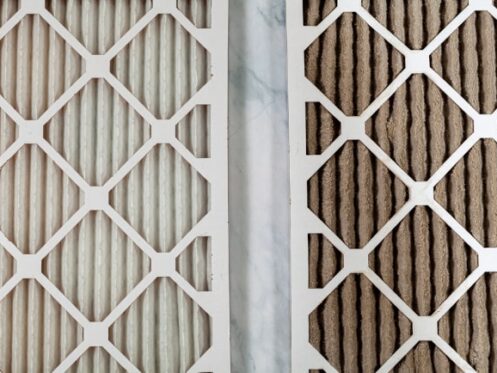Dirty air filters cause problems.
For starters, they can block airflow through your HVAC system. As dirt, dust, and other particles accumulate on the filter, the increasingly dirty filter blocks the movement of air. Basically, air moves through the system less and less efficiently, resulting in conditioned air not getting to the places you need it. You may also have to pay more for heating and cooling since it takes more energy to move more air throughout your home.
Then there’s indoor air quality. As the filter gets dirty, your blower fan will start bringing in air around the filter, where there’s less resistance. The contaminants will continue to circulate in your home’s airstream.
We don’t want any of these things to happen, so…
You’re probably wondering: When should I change my air conditioner’s filter?
It’s an excellent question. In deciding when to change your HVAC system’s air filter, you need to be thinking about:
- The type of filter you have
- How often the manufacturer says to replace it
- Static pressure within the HVAC system
The first two are easy to understand, but what is static pressure?
Static pressure is a bit of an advanced concept, but here’s what you need to know. When air moves through a duct system, it creates a certain amount of measurable pressure. Having the right amount helps to ensure your HVAC system adequately distributes conditioned air throughout your home.
Too much static pressure results in airflow problems, noisy HVAC systems, and more wear-and-tear on equipment. Poorly designed duct systems often result in excess static pressure – we see it all the time! Basically, high static pressure acts as a restriction on airflow.
So, does a really dirty air filter increase static pressure in the system? Absolutely. For this reason, you need to replace or clean your air filter when it gets dirty enough to increase static pressure above the desirable threshold for your system.
At PV Heating, Cooling & Plumbing, we have instruments for measuring static pressure. You probably don’t, and that’s ok! Here are some ways to be sure you’re changing or cleaning your air filter before it gets dirty enough to create excess static pressure in your duct system.
Strategy #1: Change or clean the filter according to the manufacturer’s instructions
If it’s a 30-day filter, replace it every 30 days. If it’s a 90-day filter, replace it every 90 days. Simply set a calendar alert on your phone and switch out the filter. Done!
This is the easiest way to ensure you’re changing the filter before it gets dirty enough to cause problems.
Strategy #2: Follow strategy #1… but with some adjustments
If you’re not using much AC or heat in March or April, why would you switch out the filter every 30 days?
Those “30-day” and “90-day” ratings for filters assume you’re running the system all the time. When you aren’t, you don’t need to follow the instructions to the letter.
If it’s a 90-day filter, just be sure you’re replacing or cleaning it after roughly 90 days of actual use. Ditto for 30-day filters.
Strategy #3: Get a better filter and replace it less often
Most people use 1” pleated air filters rated for 90 days. The reason you have to replace these filters so often is that 1” of thickness doesn’t give the filter a lot of surface area. They get dirty really fast, increase the static pressure in the system, and restrict the movement of air.
A filter with more surface area won’t restrict airflow as much. It will also take longer to reach the “too dirty” threshold, so you won’t have to change it as often.
These filters exist! They’re called media filters, and they’re usually 4” thick.
These filters’ greater surface area allows more air to flow through the system. It also takes a lot longer for them to get so dirty that they increase static pressure above the desirable threshold.
Most people only need to change their media filters once per year, especially when they don’t run their systems much during the spring and fall. If you have furry pets, you should probably replace the filter every 6 months since the filters will get clogged with hair.
A word about filter size
The size of your air filter isn’t random. Assuming you have a well-designed duct system, the air filter should be of a proper size for the ducts it’s paired with and for the amount of air it’s tasked with filtering.
Unfortunately, many homes don’t have very well designed duct systems; the air filters aren’t the right size either. In lots of cases, the filter isn’t as large as it should be, leading to additional harmful resistance to airflow and – you guessed it! – more static pressure in the system.
While you’ll need to have a pro perform a Manual D calculation to be sure, many homes can benefit from a larger filter and a deeper plenum box. Both of these features can provide the system with more – and better filtered – return air, helping to optimize airflow and improve the performance of the system overall.
As it happens, 5-ton air conditioning systems (and many 4-ton ones) require an additional 6” of return plenum space so that the right amount of air enters the system. Many HVAC contractors fail to build this 6” plenum onto the systems they install, resulting in inadequate return air. You’ll know they messed this up when you go to change the filter and you see that only part of it is dirty. The rest of it wasn’t filtering anything because there wasn’t enough air moving through the system in the first place!
At PV Heating, Cooling & Plumbing, we always include the additional 6” plenum. For some installations, we may add an additional return plenum and filter to get the right amount of airflow and filtration for the home.
Note that we tend to uncover a lot of air filtration issues during regular HVAC maintenance visits. When you sign up for Priority Service, you get two system inspections and tune-ups each year. Our technicians will thoroughly inspect your system’s filter and overall filtration setup to ensure you’re getting the best possible solution for system airflow and indoor air quality.
So, you should change your air conditioner’s filter when…
…you reach the 30 or 90-day usage mark. Just check your filter manufacturer’s instructions and do your best to follow them.
Remember that media filters do a better job filtering air and only need to be changed every 6 to 12 months. They’re a great investment for better indoor air quality, airflow, and comfort!
If you have any more questions about changing or cleaning your air filter or improving indoor air quality in your Atlanta-area home, get in touch with PV Heating, Cooling & Plumbing today! Just call us at (404) 798-9672 or complete the form below.

